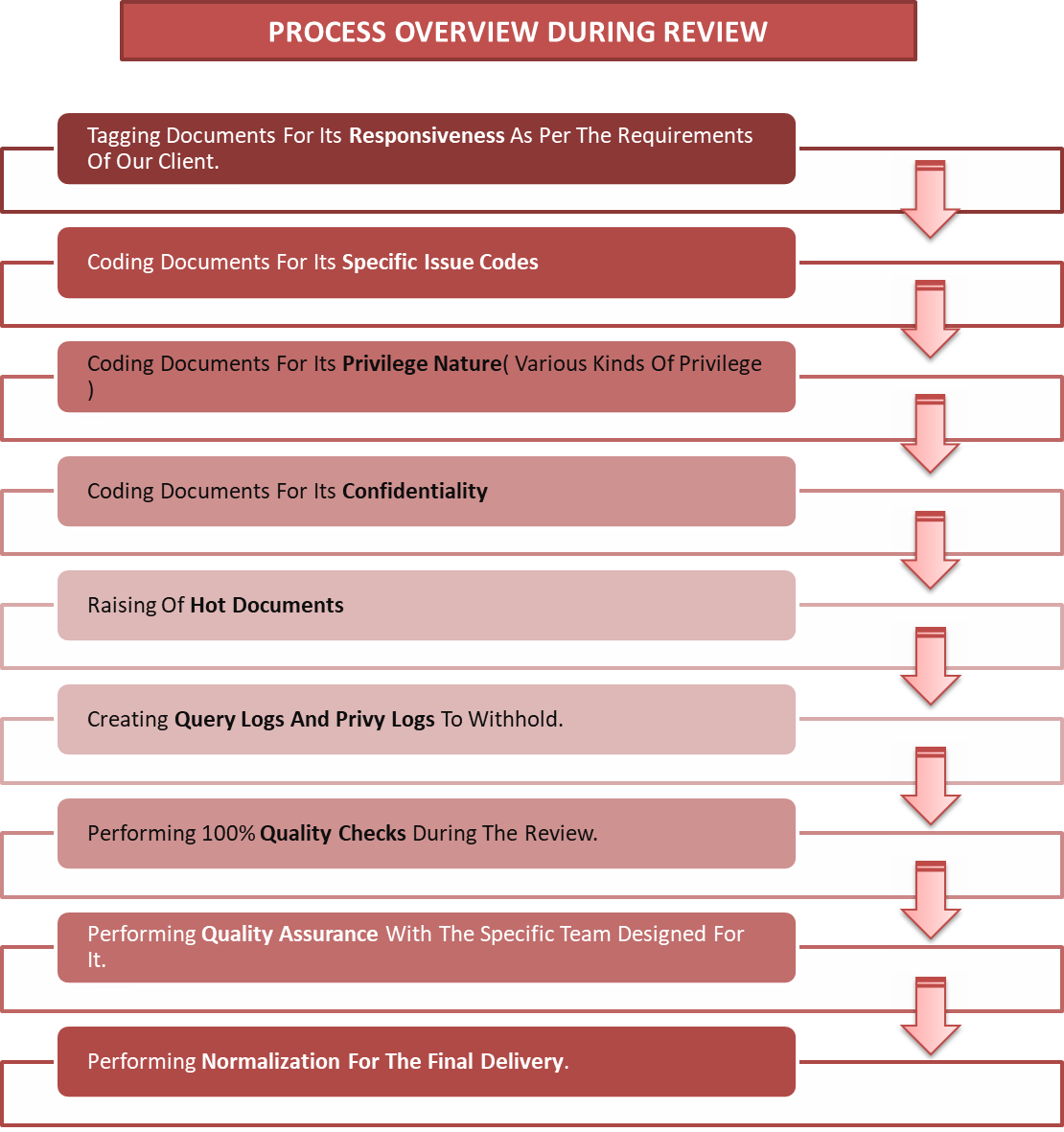Review Often referred to as document review—is the process by which teams of attorneys evaluate the processed data for responsiveness, attorney-client privilege, work product protection, and other sensitive information. Legal teams then red act and log this information before producing the data.
HOW DOES VLS SUPPORT IN THE REVIEW ?
This is made possible by a fantastic collaboration between our capable legal review team and cutting edge technologies. Our team is knowledgeable about the legal and factual problems involved in the dispute and makes the required decisions on privilege and timeliness. Codes for specific issues, confidentiality, and Tagging for Hot are all included. The team looks at each document individually to assess what kind of information it includes.
We have a review team that has an expertise in subject matter with industries related to :
• Contract and Breach Issues
• Patent Matters
• IP Matters
• Product Liability
• Internal and Regulatory Investigation
• Class Actions
• Regulatory Productions
• Securities and Fintech
• Privacy and Data Issues
• Employment Issues
• And also as per your specific needs

PRIVILEGE REVIEW
In document review, the concept of privileges refers to certain categories of information that are protected from disclosure during legal proceedings. Here are some common types of privileges that may arise in the context of document review:
TYPES OF PRIVILEGE REVIEW
1. Attorney-Client Privilege
This privilege protects confidential communications between an attorney and their client. It ensures that clients can freely and openly communicate with their attorneys without fear of those communications being disclosed in court. Documents covered by attorney-client privilege are typically excluded from production during document review, unless the privilege is waived by the client or certain exceptions apply.
2. Trade Secrets
Certain documents may contain proprietary information or trade secrets belonging to a company. These documents are protected by law and are generally not produced during document review if they fall under the category of trade secrets. The aim is to prevent the unauthorized disclosure of valuable business information.
3. Executive Privilege
Executive privilege is a doctrine that allows the President or other high-ranking government officials to withhold certain sensitive documents from disclosure, particularly in the context of legal proceedings. This privilege is typically associated with matters of national security or protecting the confidentiality of presidential decision-making.
It's important to note that the specific types of privileges can vary depending on jurisdiction and the nature of the case. The determination of privileged documents is often made through a separate review process, where trained reviewers assess the relevance and potential privilege status of each document.
4. Work Product Doctrine
The work product doctrine protects documents and materials prepared by an attorney or their team in anticipation of litigation. It encourages attorneys to diligently investigate and prepare their cases without concern that their work will be used against their client. Like attorney-client privilege, work product materials are generally shielded from disclosure during document review, unless waived or subject to exceptions
5. SAR privilege
The term "SAR privilege" refers to the privilege associated with Suspicious Activity Reports (SARs) in the context of financial institutions and anti-money laundering regulations. Here is some information based on the provided search results regarding the SAR privilege:
The SAR privilege is a concept that pertains to the confidentiality and protection of certain information related to the reporting of suspicious activities. Financial institutions are required to file SARs with appropriate authorities when they encounter transactions or activities that raise suspicions of money laundering, fraud, or other illicit activities.
6. Marinating Privilege Logs
At VLS we make sure that during the document review process, privileged documents are identified and withheld from production. This helps our client to ensure transparency, facilitate the protection of privileged information, and enable the parties involved to review and address any privilege-related concerns.
7. Reviewing document for its Confidentiality
Reviewers or individuals involved in the process adhere to strict confidentiality protocols to protect the privacy, integrity, and security of the documents being reviewed. Confidential and highly confidential information is handled with greater care, restricted access, which may require additional security measures to maintain its confidentiality.
8. Reviewing document for its Hot nature
In the context of document review, the term "hot documents" typically refers to documents that are highly relevant or significant to a particular case or matter. These documents often play a crucial role in shaping the outcome of legal proceedings. Our legal team of reviewers ensures Proper identification that these documents receive appropriate attention and consideration. Various techniques, such as keyword searches, advanced analytics, or expert guidance, to identify and categorize hot documents based on their relevance and importance are employed by our expert reviewers.